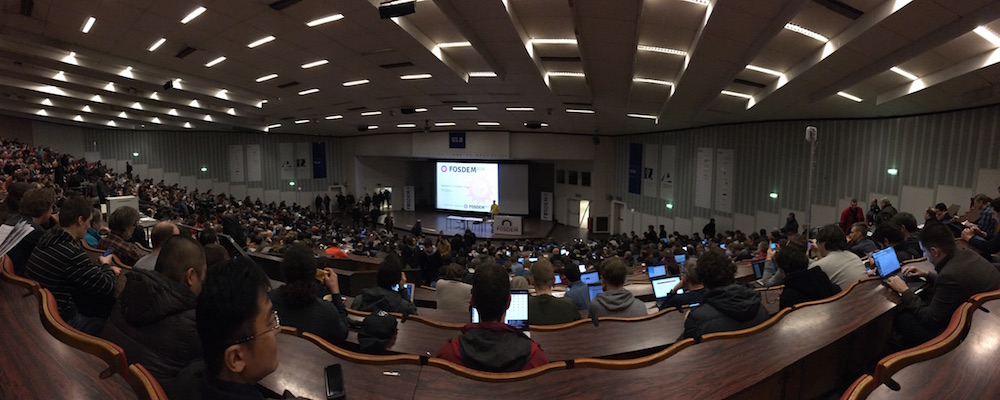Last weekend it was once again time for FOSDEM, so I hopped onto a plane on Friday morning to Brussels to be there. For details about the trip itself please check my travelogue which I plan to extend over the next couple of days with some more information. I still want to write about the main event here simply because it’s highly technical in nature 😉

Just before the welcome notes at FOSDEM
FOSDEM was once again held at the ULB and basically everything apart from the actual talks and tracks was identical to last year’s event. So yes, I once again had far too many waffles, although it is debatable whether or not there is such a thing. I also finally managed to make it to the beer event on the evening before the conference. Probably won’t miss it again if I can help it.
Among the more than 600 sessions taking place turing the two days it was once again extremely hard to decide where to go. As during last year’s FOSDEM I made it into the legal and Go tracks but also visited the lightning talks and Mozilla ones for a short while.
Contrary to last year’s post I don’t want to focus on all the talks I’ve seen, though, but simply write a bit about the things I’ve learnt from them or got me excited 😊
-
Thanks to Anand Babu Periasamy I now not only know about his S3 compatible server written in Go called Minio but also found out about go-bindata-assetfs, which wraps go-bindata to be usable directly within Go’s http server environment. I can’t wait to give this a try for writing single-binary web applications in combination with things like React 😊
-
Right after that, Jonathan Boulle gave an overview about etcd, the distributed configuration system developed for CoreOS. It had been on my radar for years now but to this date I haven’t yet had the change to give it a try. Jonathan also mentioned (among others) two tools based on or tightly coupled with etcd that I hadn’t heard of before: confd, a program that allows you to manage classic configuration files from etcd, and vulcand, a proxy/loadbalancer configured through etcd.
-
Again on the Go track I listend to Derek Parker about why I should use delve for debugging Go code. On OSX getting it to run is a bit more complicated but it looks well worth it if you don’t want to clutter your code full of log statements 😉
-
While being in a queue for waffles Ulrich told me about a lightning talk by [Hisham Muhammad][] about htop and it appearantly finally getting a proper OSX port 😃
-
During a talk about dependency management Camille Moulin dropped the term SPDX, which is an attempt at standardizing license-related metadata. On the periphery I had been aware of that topic and problems related to it but that talk motivated me to finally find some time to look into the tooling and standards available on this front.
-
In my previous team we had started to struggle a bit with our Jenkins configuration due to far too many jobs being required for all of our projects. For possible alternatives I went to a talk about the Jenkins Job DSL by Łukasz Szczęsny and Marcin Zajączkowski. I haven’t completely understood its advantages and disadvantages yet but I’ll most likely give it a more detailed look in the future.
-
Thanks to François Marier and Raegan MacDonald I learnt about two tools by the EFF and Mozilla respectively that should help in the future with some privacy concerns: Panopticlick and Lightbeam
-
The last and probably most exciting session of them all was the last keynote on Sunday given by Blake Girardot about all the work the Humanitarian OpenStreetMap Team does and how open source helps them. If you ever want to see, how much good you can do by contributing to opensource, directly or indirectly, watch this talk!
A big THANK YOU to all the organisers and volunteers! It was, once again, amazing and perhaps we can have some nice weather next year 😉

Do you want to give me feedback about this article in private? Please send it to comments@zerokspot.com.
Alternatively, this website also supports Webmentions. If you write a post on a blog that supports this technique, I should get notified about your link 🙂